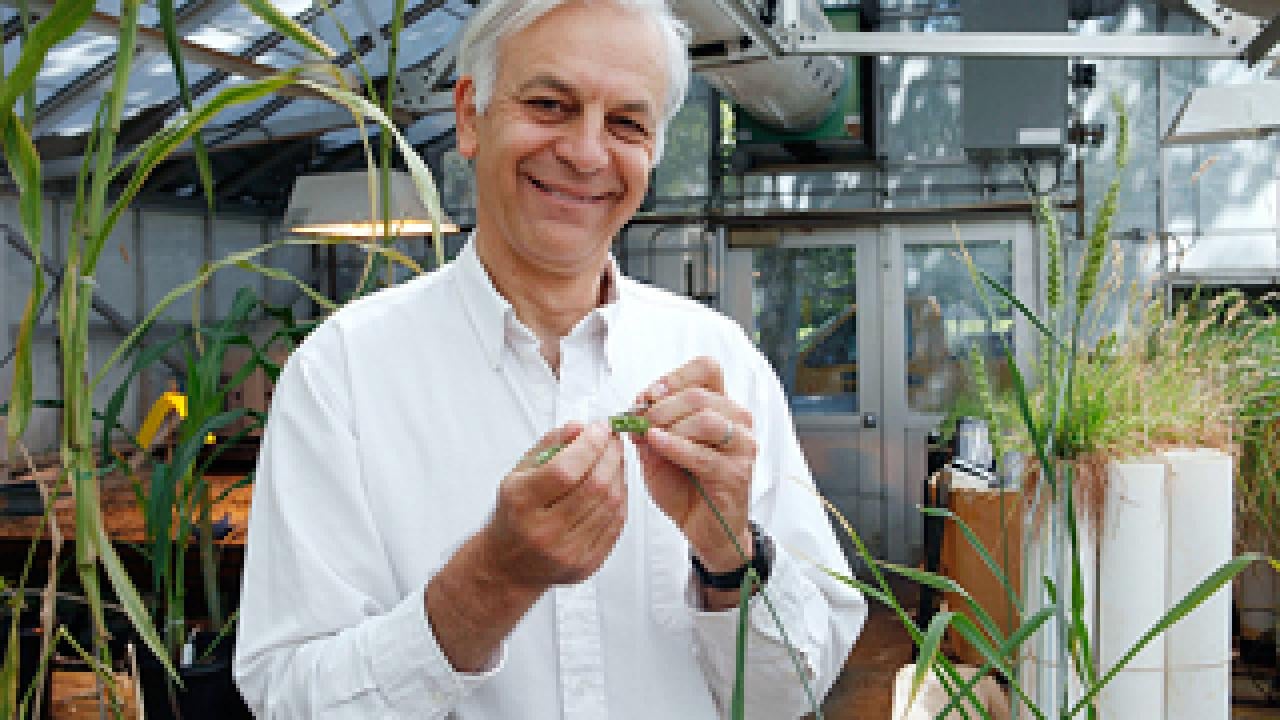Jorge Dubcovsky, an internationally acclaimed wheat geneticist at the University of California, Davis, has been elected to the National Academy of Sciences, one of the highest honors bestowed on scientists and engineers in the United States. Peter Hall, an Australian statistician with a partial appointment at UC Davis, was elected as a foreign associate of the academy. They join 21 other UC Davis members of the academy.
Dubcovsky is a professor in the Department of Plant Sciences and a Howard Hughes Medical Institute and Gordon and Betty Moore Foundation investigator.
Over the years, Dubcovsky has become a national and international leader in wheat genomics research, and has helped distribute improved wheat seeds to countries around the world.
Born and raised in Argentina, Dubcovsky began his career teaching middle school science and math classes, and earned his bachelor’s degree in biological sciences from the University of Buenos Aires in 1984. He continued taking university-level courses to deepen his understanding of the disciplines in which he was teaching.
He then became intrigued by scientific research and enrolled in a doctoral program, studying the genetics and evolution of Patagonian grasses, which have evolved to withstand the windy, arid and cold environment of Argentina’s uplands. He realized that, in order to develop hardier, more productive crops, plant breeders must understand the evolutionary path followed by the crop’s ancestors.
Dubcovsky earned his doctoral degree in biological sciences in 1989 from the University of Buenos Aires. He came to UC Davis in 1992 for a research fellowship, interested in the techniques that were becoming available in the growing field of molecular biology. Employing such techniques, he and fellow researchers were able to use molecular markers to mine new information about plant biology and generate the first molecular genetics maps in wheat.
He spent the following two years doing research in Argentina, but returned in 1994 to direct the wheat-breading program at UC Davis.
During the past two decades, Dubcovsky has conducted pioneering research in mapping, isolating, and cloning genes in wheat’s massive genome. He and his laboratory colleagues have identified and cloned genes involved in disease resistance, protein content, flowering and frost tolerance. Identification of these important genes has enabled researchers and breeders to use conventional breeding techniques to develop hardier, more nutritious wheat varieties.
A product of the 1960s and ‘70s, Dubcovsky says that the social ideals of that generation, combined with his exposure to poverty in his homeland, impressed upon him the importance of working to ensure that science makes tangible, positive impacts on the world.
In 2011, he received a multimillion dollar U.S. Department of Agriculture grant to lead researchers, plant breeders and educators from 55 universities and 21 states in an investigation of the biological and environmental stresses on wheat that are caused, in part, by alterations in weather patterns associated with global climate change.
That same year, he was named among the first-ever class of Howard Hughes Medical Institute and Gordon and Betty Moore Foundation investigators, and received a USDA Honor Award, the most prestigious award given by the agency’s secretary in recognition of exceptional leadership in science, public policy and management vital to guiding the nation’s food and agricultural system.
Hall is a professor at the University of Melbourne and, since 2006, has held a 25 percent appointment at the UC Davis Department of Statistics. He spends one quarter a year, typically spring quarter, in Davis and teaches a proportional full load over a two-year cycle.
Hall is known for his work that provides the theoretical basis for an area of statistics called non-parametric statistics, including bootstrap analysis. These methods typically involve a lot of computation and allow scientists to study very large, complex datasets, such as DNA sequence data, financial markets and Internet search results.
After completing his bachelor's degree at the University of Sydney, Hall received his doctorate, or D. Phil., from Oxford University in 1976. He first worked at the University of Melbourne and then, from 1978 to 2006, at the Australian National University in Canberra. In 2006, he moved back to Melbourne, and also took up the fractional appointment at UC Davis in the 2005-06 academic year. He had first visited Davis in 1988, and had collaborated over several years with Professors Hans-Georg Müller and Jane-Ling Wang before taking up the fractional appointment.
Earlier this year, Hall was named an Officer of the Order of Australia, among the highest civilian honors given by the Australian government.
The National Academy of Sciences is a private, nonprofit honorific society of distinguished scholars engaged in scientific and engineering research, dedicated to furthering science and technology and their use for the general welfare.
Media Resources
Pat Bailey, Research news (emphasis: agricultural and nutritional sciences, and veterinary medicine), 530-219-9640, pjbailey@ucdavis.edu
Jorge Dubcovsky, Plant Sciences, 530-752-5159, jdubcovsky@ucdavis.edu
